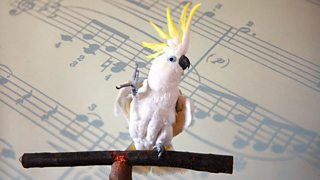Do our cats judge us?
Comedian Suzi Ruffell adores her cat, Velma, but thinks lockdown has made her a tad tetchy. Is Suzi projecting her own insecurities on to an unsuspecting animal or are those pointed stares a sign that the Cornish Rex is passing frosty judgement on her owner's life choices? In My Cat, The Judge, Velma and her human sidekick embark on a journey of discovery to find out more about cat behaviour, the world of feline research and of course, to seek an answer to Suzi's burning question: is her cat judging her?
We love our cats because they remind us of babies
Dr Lauren Finka specialises in animal behaviour, with a focus on domestic cats. She explains how a hypothesis called the Baby Schema might explain why we’re drawn to caring for cats.
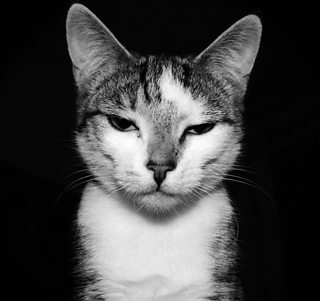
Just because we want to cuddle them or spend a lot of time with them, it doesn’t necessarily always mean that they’re as happy to do this.Dr. Lauren Finka
Human babies have big round faces and wide eyes. “These visual features are supposed to tap into our innate desire to provide care and concern for another individual,” says Lauren. So, if we transfer this over to companion animals, those who have similar features are likely to instil the same feelings and the same desire to provide care. Certain breeds of cats – those with exaggerated physical characteristics that we find “cute” – are likely to trigger this need to nurture too.
Our cats may not like being stroked as much as we think
Carlo Siracusa is an Associate Professor of animal behaviour and welfare who edited a book, written by vets, called Decoding Your Cat. He says we have a habit to project the same physical needs that humans have on to cats – but the idea that they like “constantly being petted, or being hugged or kissed” isn’t true.
Lauren agrees: “I think it’s really important that we understand that our needs and our desires in the relationship we have with our cats are not necessarily the same as theirs. Just because we want to interact with them, just because we want to cuddle them or spend a lot of time with them, it doesn’t necessarily always mean that they’re as happy to do this.” Even cats who are total “lovebugs”, might want to go off and spend some time by themselves, she says.
A needy owner could mean a frustrated and anxious cat
We have a tendency to ask too much of our pets, says Carlo. During the pandemic many became surrogates of our “lost social relationships” – and that’s a lot of pressure for any animal.
A lot of cat owners who come to him asking for help with their troublesome felines do so as a result of these expectations. “Maybe they are not aware that this is the problem but really the cat is feeling the pressure of that relationship, which doesn’t respect their terms,” says Carlo. “They find just some things that we do very rude and very inappropriate.” These social pressures can take a toll on a cat’s mental health, with them becoming very nervous, frustrated, anxious – and quicker to bite!
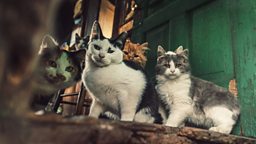
Cats have feelings – and can be governed by their emotions
Our knowledge of cats has changed a lot, says Carlo. The science is now recognising what dog or cat owners have always known: that their pet has feelings: “Now we recognise that animals can have emotions – they don’t do everything for dominance or submission or to get a higher hierarchical spot in the family. We actually know that animals do things for pleasure, for fear.”
“But keep in mind one thing,” he warns. “We are still two different species and the basic behaviour is very different.” Whereas humans are very social creatures who like to gather together, “this is not a cat’s habits.”
There’s no such thing as a spiteful cat
Our tendency to anthropomorphise cats, and project human behaviours on to them, applies to when they bite or scratch too. Many people will describe a cat as doing something “spiteful” or “vindictive”, but this is not the reality, says Carlo. “This is a high level of planning and emotions that animals do not have. I think that people project a lot of these very complex emotion on cats.”
Cats can be trained to copy our actions
Kristyn Vitale, an assistant professor of animal health and behaviour, teaches and conducts research on the social behaviour and cognition of cats, as well as the human-cat relationship.
“One really cool study that highlights how smart cats are was just recently published,” she says. “A person trained their cat to replicate the actions that they showed them.” The aim of this “do as I do” training method, was that when the owner lifted their leg the cat should do the same. “The cat actually ended up matching the behaviour of the owner on 81% of the trials,” says Kristyn.
However, this intelligence obviously does differ by cat. In any population of animals we’re going to see variability, she says, with some cats demonstrating more intelligence in some areas than others.
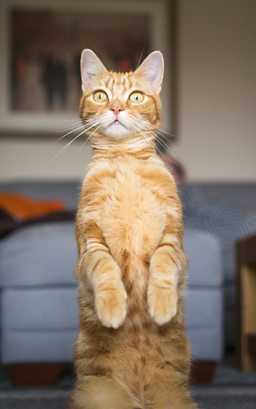
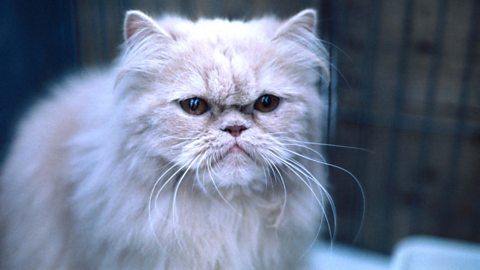
How high is your cat's IQ?
Professor Kristyn Vitale investigates.
Do our cats judge us?
So, in answer to Suzi’s question, is there any chance that Velma could be judging her? Even a little bit?
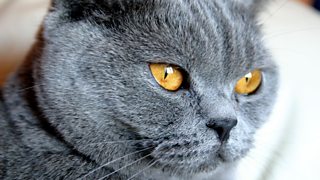
Cats can exhibit quite distinct preferences, or likes and dislikes for things that we do – and that might look a little bit like they are judging us.Dr. Lauren Finka
“I’d probably say yes and no,” says Lauren. “What we know about cats from a research perspective is that they are sensitive to our facial expressions, to differences in our emotional states, differences in our behaviour, and they can exhibit quite distinct preferences, or likes and dislikes for things that we do – and that might look a little bit like they are judging us.”
Kristyn is less ambivalent: “I do think that cats are able to recognise if a person treats them well or not. For example, they might know to stay away from somebody who yells at them. But I don’t necessarily think that they’re forming an opinion about that person’s behaviour. They probably don’t think that because that person yells at me they’re a bad person.”
And for Carlo, the answer is clear: “No, I don’t think so. Your cat is not judging you. I think your cat is just trying to understand what’s happening next.”
In conclusion, cats don’t need to socialise like people do – they enjoy some interaction, but on their own terms and, although they’re clever, they don’t experience the same complex emotions as humans. The scientific verdict is no, your cat is not judging you. But, like most cat owners, Suzi’s going to take some convincing…
To find out more, listen to My Cat, The Judge.
More from Radio 4
-
![]()
A Sense of Music
What happens when music meets the animal mind?
-
![]()
On the Menu
Adam Hart explores our relationship with some of the animal kingdom's deadliest predators.
-
![]()
Natural Histories
Nature that has had a profound impact on human culture and society across history.
-
![]()
10 incredible facts about Octopuses
A few amazing things you didn't know about these incredible invertebrates.

